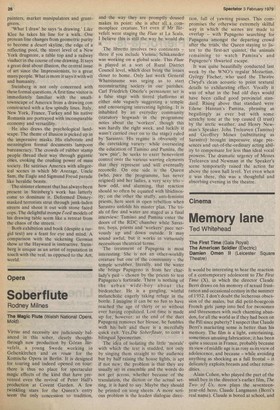Soberf lute
Rodney Milnes
The Magic Flute (Welsh National Opera, Mold) Virtue and necessity are judiciously balanced in this sober, clearly thoughtthrough new production by Goran Jarvefelt, a young Swede working in Gelsenkirchen and en route for the Komische Opera in Berlin. It is designed for touring and indeed opened on tour: there is thus no place for spectacular magic effects of the kind that have prevented even the revival of Peter Hall's production at Covent Garden. A few twinkling stars for the Queen's entry seem the only concession to tradition, and the way they are promptly doused makes its point: she is after all a commonplace creature. Yet even if Mr Jarvefelt were staging the Flute at La Scala, I believe this is still the way he would do it.
The libretto involves two continents — three if you include Vienna; Schikaneder was working on a global scale. This Flute is played at a sort of Rural District Council level, which does bring the issues closer to home. Only last week General Whatsisname was urging us to start reconstructing society in our parishes. Carl Friedrich Oberle's permanent set is a false stage with tiered platforms at either side vaguely suggesting a temple and encouraging interesting lighting. It is inhabited by an everyday community (statutory hogwash in the programme notes about the 'workers', though this was hardly the right week, and luckily it wasn't carried over on to the stage) ruled by Sarastro. His regime is obviously of the caretaking variety: while overseeing the education of Tamino and Pamina, the 'new pair', he seeks to exert benevolent control over the various warring elements that they represent and will eventually reconcile. On one side is the Queen (who, pace the programme, has never reigned) and her ladies, a very sexy trio — how odd, and alarming, that reaction should so often be equated with libidinosity; on the other the stuffy, anti-feminist priests, here seen in open rebellion when Sarastro unfolds his master plan. The trials of fire and water are staged as a final interview: Tamino and Pamina enter the doors of the RDC chamber while Sarastro, boys, priests and 'workers' pace nervously up and down outside. It may sound awful, but it works in virtuously necessitous theatrical terms.
The treatment of Papagena is most interesting. She is not an other-worldly creature but one of the community — the temple scrubber, literally, and the water she brings Papageno is from her charlady's pail — chosen by the priests to test Papageno's fortitude. There is nothing of the urban wide-boy about the birdcatcher. He is a gangling, wistful melancholic eagerly taking refuge in the bottle. I imagine it can be no fun to have reached the age of thirty or so without ever having copulated. Lost time is made up for, however: at the end of the duet Papagena removes her blouse, he fumbles with his belt and there is a mercifully quick exit. Yes,Die Soberflaute, to coin a bilingual Spoonerism.
The idea of isolating the little 'morals' with which the text is studded, not only by singing them straight to the audience but by half raising the house lights, is apt if not new; the problem is that they are usually set in ensemble and the words do not get across, whether because of the translation, the diction or the actual setting, it is hard to say. Maybe they should be printed on song sheets. A more serious problem is the leaden dialogue direc tion, full of yawning pauses. This compromises the otherwise extremely skilful way in which the scenes are made to overlap — with Papageno searching for Papagena amongst the departing crowd after the trials, the Queen staying to listen to the first-act quintet, the animals remaining to watch Pamina's and Papageno's thwarted escape.
It was quite beautifully conducted last week by the WNO's regular Mozartian, GyOrgy Fischer, who used the Theatre Clwyd's clean acoustic to point textural details to exhilarating effect. Vocally it was of what in the bad old days would have been called good provincial standard. Rising above that standard were Eilene Hannan's Pamina, phrasing as beguilingly as ever but with some scratchy tone at the top caused (I trust) by the arctic weather, and Henry Newman's Speaker. John Treleaven (Tamino) and Geoffrey Moses (substituting as Sarastro) brought impressive stage presences and out-of-the-ordinary acting ability to compensate for less than ideal vocal prowess. The dramatic urgency of Messrs Treleaven and Newman in the Speaker's scene temporarily raised the action far above the town hall level. Yet even when it was there, this was a thoughtful and absorbing evening in the theatre.


































 Previous page
Previous page